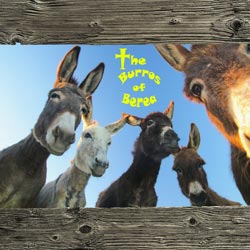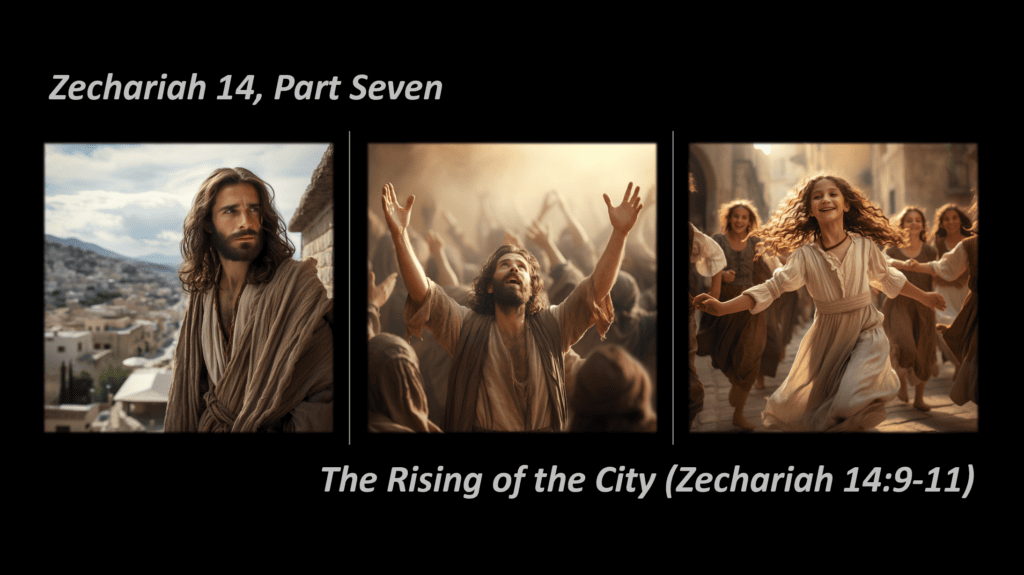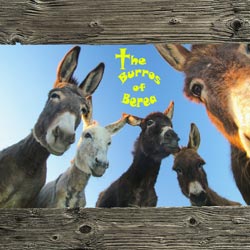Zechariah 14, Part 7 (Zechariah 14:9-11)
Copyright © Robert E. Cruickshank, Jr (September 28, 2023)
Ron Cuzzort (Editor)
All Rights Reserved
“And the Lord will be King over all the earth; on that day the Lord will be the only one, and His name the only one. All the land will change into a plain from Geba to Rimmon south of Jerusalem; but Jerusalem will rise and remain on its site from Benjamin’s Gate as far as the place of the First Gate to the Corner Gate, and from the Tower of Hananel to the king’s wine presses. People will live in it, and there will no longer be a curse, for Jerusalem will live in security” (Zechariah 14:9-11).
These verses speak of both the exclusiveness and the extent of Christ’s reign. Zechariah looks forward to a time when the Lord is the only one, and He is king over all the earth. This is accomplished through His people who comprise the New Jerusalem, which is pictured as rising above the rest of the land which becomes a flat plain. The exclusivity of the Lord among His people is reinforced by the idea that all accursed things are removed from the newly raised Jerusalem as God’s people dwell securely in Him.
An Old Problem
Throughout Old Covenant Israel’s history, God’s people had a problem, and it wouldn’t go away. They had a problem with the second commandment: “You shall have no other gods besides me” (Exod. 20:3).
Despite all that the Lord had done for them, time and again, the ancient Israelites constantly reverted back to worshipping other gods. It started right away with the golden calf (Exod. 32:1-10) and the goat demons in the wilderness (Lev. 17:7) and continued until it sent them into exile (Zeph. 4:1-6). By the time of the New Testament, Stephen informs us that nothing had changed. When he was dragged before the high priest and the synagogue council, Stephen recounted the apostate deeds of their ancestors and told them, “…you are doing just as your fathers did” (Acts 7:40-43; Acts 7:51). It seems like polytheism was a persistent predicament under the Old Covenant – then Jesus stepped in and established a New Covenant.
Unlike the Old Covenant, the Writer to the Hebrews tells us that everything would change under the New Covenant – specifically with regard to the matter of worshiping other gods: “…I will put My laws into their minds, and write them on their hearts. And I will be their God, and they shall be My people” (Heb. 8:10b). The last line of this verse from Hebrews is nearly identical to the words of Revelation 21:3, describing the New Jerusalem: “Behold the dwelling place of God is with man. He will dwell with them, and they will be his people and God himself will be with them as their God.” As pointed out in the previous article, the New Jerusalem isn’t a literal city with physical walls. The city is the people themselves, and the people are the city. Where God’s people are, God’s city is. God is present in and through His people, and His people worship Him exclusively. Old Covenant Israel’s problem with polytheism doesn’t exist under the New Covenant, in the New Jerusalem.
A New Solution
From the beginning, this has been what God has always wanted: a human family who would exercise believing loyalty to Him and to Him alone. In order to do this, however, God Himself had to join His human family and establish an infallible covenant that couldn’t be broken. As the late Dr. Michael Heiser wrote, “…God’s children needed new hearts and God’s presence to help them believe. They needed a means to be saved from themselves and from a destiny that didn’t include everlasting life with the God who loved them. There had to be a way for God to honor his covenant promises…and to help his people continue in their faith. God’s solution to these problems was radical. He had to become a man. He had to join the human race. This is where Jesus enters the story. Jesus was God become man (John 1:1, 14-15; Col 1:15-20; 2:6-9). He was the solution to every one of these obstacles.”[1]
With the solution to our problems provided through the work of Christ, New Covenant believers are loyal to Him and Him alone. The true believer has no other gods besides Him. When we put our faith and trust in Jesus, He becomes “the only one, and His name the only one” (Zech. 14:9b). Zechariah’s prophecy was looking forward to the day when this would become a reality. That day became a reality when the New Covenant began to dawn through the atoning work of Jesus Christ. Centuries later, the light of that day continues to shine through us (Isa. 60:1-3; 2 Pt. 1:19), and the nations should be walking by the light that we provide (Rev. 21:24). We have the solution, and our job is to share that solution with the world around us.
King Over All the Earth
Zechariah said that “the Lord will be King over all the earth” (Zech. 14:9a). These words are echoed in John’s words in Revelation when he says that “Jesus Christ” is “the firstborn of the dead” and “the ruler of the kings of the earth” (Rev. 1:5). As David Chilton wrote, “As the Firstborn, Christ possesses the crown rights of all creation: ‘All authority in heaven and earth has been given to Me,’ He claimed (Matt. 28:18). All nations have been granted to Him as His inheritance, and the kings of earth are under court order to submit to Him (Ps. 2:8-12).”[2] As New Covenant believers and His image bearers in the new creation, we are His representatives who are supposed to be issuing this “court order” to the world. We share the Gospel, we advance the kingdom, and we grow the city. The anticipation of Zechariah 14:9 finds its fulfillment in Revelation 1:5, and we should be getting the memo out: Jesus Christ is the King over all the earth.
The Rising of the City
Christ’s kingship, as it is manifested through His people (the members of the New Jerusalem), is portrayed in verse 10 as Jerusalem being elevated while the land around is leveled. This is similar to the words of John the Baptist, where the geographical movements of mountains are clearly not meant to be understood literally (Lk. 3:5). Having said that, extreme literalism reaches new heights (pardon the pun) in its approach to the city of Jerusalem rising above all that it surrounds (Zech. 14:10). “This amazing prophecy,” we are told, “will literally redraw the map of Africa and the Arabian region, as well as Israel.”[3]
According to the latest theory, a somewhat recently discovered rift in the earth’s crust will cause tectonic activity resulting in the city of Jerusalem being physically raised in its elevation. “In an astonishing turn of events,” writes Jonna Marcaida Calagui, “geologists discovered a major fault line composed of multiple fractures under Mount Olives in 1964 when the Jordanians tried to build a hotel on the fabled mountain.”[4] In reaction to finding out about the fault line, Leisha Cole of Tandem Hope ministries exclaims, “Did you know about the geographical fault line near the Mount of Olives? I sure didn’t. Hello, Prophecy! Hello, Reality.”[5]
Cracks in the Road
This newly detected fault line is the key to everything for extreme literalists. Josh Wander, of Israel 365, spends time making videos as he looks for “cracks in the road” on the Mount of Olives. Wander says that he is investigating as to whether this is the “unfolding of the actual prophecy of Zechariah himself”[6] One might question why the Mount of Olives doesn’t just split already if in fact the prophesied fault-line rupture has begun. The Futurists assure us that we should not be dissuaded by this apparent lull in the action. According to Lisa Muhar, we are merely experiencing some prophetic “down time” before these splits “eventually create the ‘very great valley’ that Zechariah predicted.”[7] And these splits are critical to Jerusalem’s rising in verse 10, or so we are told.
W.J.J. Glashouwer, chairman of Christians for Israel, informs us that when the Mount of Olives splits in two, “geological activities will take place resulting in pushing up the earth’s crust under Jerusalem.”[8] This is all thought to work together to fulfill Zechariah 14:4 (the Mount of Olives splitting) and Zechariah 14:10 (the City of Jerusalem rising). Zechariah’s words are often coupled with the words of the earlier prophet, Isaiah, who said:
“It shall come to pass in the latter days, that the mountain of the house of the Lord shall be established as the highest of the mountains and shall be lifted up above the hills; and all the nations shall flow to it” (Isa. 2:2).
Both prophets speak of the rising of the mountain of the house of the Lord or Jerusalem, as well as the nations flowing to it. In Zechariah, this happens yearly during the Feast of Tabernacles (Zech. 14:16). Envisioning a future fulfillment of these events, Professor Klaus Wengst writes:
“Israel and its Messiah will come together. In the end, when the times of the nations come to an end, Israel will accept its Messiah and then the ‘kingdom for Israel’ will also be restored (Acts 1:6; cf. Mt 23:37-39; Lk 21:24; Rom 11:26). Then the great prophecy of Isaiah 2:1-5 will be fulfilled, that the nations of the world will stream up to Jerusalem to worship the God of Israel – what a tremendous perspective!”[9]
Wengst’s choice of words is apropos. He speaks of the nations streaming “up” to Jerusalem, which is exactly what they’ll have to do – go up, way up. If Jerusalem is literally going to be raised above every other mountain in the world, this will be quite the climb!
Rocky Mountain High
The highest point in the Rocky Mountains is almost 3 miles, the Himalayas reach 5 ½ miles in stature, and the tallest mountain on earth is Mauna Kea which is approximately 6 ½ miles high.[10] If these passages are to be understood literally, the new and improved Mount Zion would have to be higher in elevation than all of these. Do we really believe everyone in the world is going to climb this newly formed mountain? Additionally, aside from the height of the climb itself, there wouldn’t be much room to move while making the climb. Every time the Feast of Tabernacles rolls around (Zech. 14:16), every single person on the face of the planet will show up, equipped with harnesses and mountain climbing gear, making the annual expedition up the world’s largest mountain.
Of course, literalists could argue that people will fly to the mountain in planes and helicopters. This wouldn’t be a very literal interpretation, however, since neither Zechariah nor Isaiah mention anything about planes and helicopters. Zechariah does mention “horses” several times, and Jack Kelley argues that the Hebrew word for horse “would be something like leaper in English” and could refer to “helicopters and planes.”[11] So there’s that. But this just creates even greater problems. Is there going to be enough room on the peak of this new mountain for all the helicopters and planes to land? This is especially the case because of all the hotels needed to accommodate the 8 billion people hanging out in Jerusalem for the week-long feast. Whether they fly or climb to get there, the literal interpretation is a “mountain” of a problem for the literalists.
Sensing this very problem, the authors of The Beyond Today Bible Commentary argue: “The nations going up annually to Jerusalem to observe the Feast of Tabernacles does not mean that every person in every nation is to go to Jerusalem every year. Rather, the Feast will be observed globally, with each nation sending a representation [sic] to Jerusalem.”[12] The problem with this is that Zechariah specifically says, “whichever of the families of the earth does not go up to Jerusalem to worship the king, the Lord of hosts, there will be no rain on them” (Zech. 14:17). This being the case, any family on the earth could justly protest a drought due to their absence. After all, their national representative was there…right?
A More Down to Earth Approach
Much like climbing the rough side of a mountain, an uber-literal understanding of the passage encounters insurmountable obstacles. Those who follow this approach never “top out” because the answer to each previous difficulty just presents a new “bouldering problem.”[13] Akin to the effects of thin air at high altitudes, the popular approach to Zechariah 14 can leave a person feeling dizzy and confused. In comparison, a biblically grounded interpretation is like a breath of fresh air – closer to the ground where oxygen levels are higher.
Peeling away the layers of the futurist approach, the passage says nothing about national delegates, helicopters or even mountain climbers. Zechariah’s messaging isn’t topographical, it’s theological. Touching on the themes of both Zechariah 14:10 and Isaiah 2:2, Ken Gentry writes:
“The mountain of the house of the LORD. The ‘house of the LORD’ refers to the new covenant church (1 Cor. 3:16; 6:19; 2 Cor. 6:16; Eph. 2:19–22; 1 Pet. 2:5), which was ‘established’ (Heb., kun implies of permanent duration) on earth ‘in the last days’… It is a ‘mountain’ in that it is a city set on a hill (Matt. 5:14; Heb. 12:22). It is to be “the chief of the mountains” (v. 2d) in that it will eventually be the world’s leading influence. Contrary to dispensationalism, this is not to be taken literalistically, as if Jerusalem will physically be elevated higher than Mount Everest (with all the health difficulties that would bring).”[14]
The rising of the mountain is simply imagery meant to capture the preeminence and prominence of the work accomplished by Jesus Christ in and through His people. Since no mountain in the world can truly depict the magnitude of that accomplishment, Isaiah describes it as being higher than any other mountain. In more modern terms, Marvin Gaye and Tammy Terrell would say, “There Ain’t No Mountain High Enough.” The work of Christ takes His people to new levels, and everything else is like a flat plain beneath them. Zechariah and Isaiah are using visual illustrations to paint the wonder of the reality of fulfillment in Christ.
Nothing Accursed in the New Jerusalem
In verse 11, Zechariah says of the New Jerusalem: “People will live in it, and there will no longer be a curse, for Jerusalem will live in security.” Due to the wording of this verse in the English (NASB), the natural inclination is to recall the “curses” of Genesis 3. However, this is not the same word for “curse” that is used in Genesis,[15] and Zechariah is not promising that snakes will start walking upright (Gen. 3:14) or that the ground will stop producing thorns and thistles (Gen. 3:17).[16] The word translated “curse” in Zechariah 14:11 is cherem and it refers to “a devoted thing” that is “put under a ban.”[17] Deuteronomy 7:25-26 is the key verse in understanding the meaning of this word and the concept behind it:
“The carved images of their gods as you shall burn with fire. You at shall not covet the silver or the gold that is on them or take it for yourselves, lest you be ensnared by it, for it is an abomination to the Lord your God. And you shall not bring an abominable thing (cherem) into your house and become devoted to destruction (cherem) like it. You shall utterly detest and abhor it, for it is devoted to destruction” (cherem) (Deut. 7:25-26, ESV).
In this verse, the cherem or “abominable things” are the graven images of the false gods of the surrounding nations. When the Israelites take possession of the land, they are strictly forbidden to take possession of the former occupants’ objects of worship. Anyone who has ever read the Old Testament knows that ancient Israel didn’t always do so well in this regard. A classic example is found in Joshua chapters 6-7. Before the conquest of Jericho, the Lord tells His people:
“But you, keep yourselves from the things devoted to destruction (cherem), lest when you have devoted (cherem) them you take any of the devoted things (cherem) and make the camp of Israel a thing for destruction (cherem) and bring trouble upon it” (Joshua 6:18).
Those who’ve read the story know that not everyone in the camp followed through, and the victory at Jericho was followed by a swift defeat at Ai (Joshua 7:1-9). The reason for the defeat is spelled out in Joshua 7:10-12:
“The Lord said to Joshua, ‘Get up! Why have you fallen on your face? Israel has sinned; they have transgressed my covenant that I commanded them; they have taken some of the devoted things (cherem); they have stolen and lied and put them among their own belongings. Therefore the people of Israel cannot stand before their enemies. They turn their backs before their enemies, because they have become devoted for destruction (cherem). I will be with you no more, unless you destroy the devoted things (cherem) from among you’” (Joshua 7:9-12).
This is exactly what Moses said would happen in Deuteronomy 7:25-26. Rather than devoting the pagan objects of worship to destruction, some in the camp took them, kept them, and brought them into their own households. When God’s people do this, they bring destruction upon themselves.
No Cherem for New Covenant Believers
Zechariah is saying that under the New Covenant, in the New Jerusalem, there will be no cherem. Graven images, Idols, and false gods have no place in the life of a true believer. Whatever we “worshiped” before coming to Christ is to be “devoted to destruction.” He and He alone is first and foremost in our life, and we do all that we do unto the glory of God (1 Cor. 10:31). This ties in perfectly with the theme of the exclusivity of the Lord introduced in verse 9, and this is what it is all about. The “old things are passed away, and all things become new” (2 Cor. 5:17). We turn our backs on the gods of men and the idols that we worshiped before turning to the Lord. For the believer, “the Lord” is “the only one, and His name is the only one” (Zech. 14:9). And even the common ordinary things in our life, right down to our means of transportation and cooking utensils in our kitchen, are to be “HOLY TO THE LORD” (Zech. 14:20-21). In the New Jerusalem, everything is sacred,[18] and there is no room for anything unsacred or profane.
This is identical to what John says regarding the New Jerusalem in the book of Revelation:
“No longer will there be anything accursed, but the throne of God and of the Lamb will be in it, and his servants will worship him. They will see his face, and his name will be on their foreheads” (Revelation 22:3-4).
The word translated “accursed” is katanáthema, and it refers to a thing “which is devoted or given over to a deity, accursed thing,” according to BDAG.[19] According to Thayer, it is “specifically, an offering resulting from a vow, which after being consecrated to a god was hung upon the walls or columns of the temple, or put in some other conspicuous place.”[20] It is a form of the same Greek word used to translate the Hebrew cherem in the Septuagint version of Zechariah 14:11.[21]
Thus, John and Zechariah are both tracking on the same idea. The meaning is not the reverse or removal of the Genesis curses, but the removal of anything that is “accursed” in the life of a true believer. As members of the New Covenant community, we don’t worship false gods anymore, nor do we make a false god out of anything in our life. For us, every aspect of our lives and all that we do is sacred, holy, and devoted to the Lord. The people of the New Jerusalem “dwell securely” by removing everything “devoted to destruction,” to not incur God’s anger and to ensure God’s blessing.
Rising Up and Moving Forward
As Jesus’ representatives in the world that He has reclaimed, we exercise believing loyalty in Him and Him alone. In so doing, we extend the invitation to accept Christ to the world around us. As people embrace Him, His Lordship embraces every area of life. As that happens, the city continues to expand and elevate.
The prophecies of Zechariah and Isaiah aren’t about tectonic shifts in the earth’s crust, they are about paradigm shifts caused by transforming power of Gospel. It is life changing, not just individually but collectively, and should permeate every aspect of life. We don’t need to look for cracks in the road in modern-day Israel, but we should be looking to crack through every barrier and obstacle that stands in the way of advancing His Kingdom here on this earth: “Destroying all arguments and all arrogance against the knowledge of God,” we are to take “every thought captive to the obedience of Christ” (2 Cor. 10:5).
As Abraham Kuyper said, “There is not a square inch in the whole domain of our human existence over which Christ, who is Sovereign over all, does not cry, Mine!”[22] As Isaiah and Zechariah pictured the mountain rising, we must rise to meet the challenges in our own lives personally and in the culture around us. Our message to the world should be: the Lord is “King over all the earth,” and “His name is the only one” (Zech. 14:9).
[1] Heiser, Michael S. What Does God Want? (p. 32). Blind Spot Press. Kindle Edition.
[2] David Chilton, The Days of Vengeance: An Exposition of the Book of Revelation (Tyler, TX: Dominion Press, 1987), p. 63.
[3] https://feedreader.com/observe/heiscomingblog.wordpress.com/2018%2F03%2F07%2Fzechariahs-prophecy-of-the-very-great-valley-widens-as-giant-fissure-splits-saudi-arabia-in-two-pics-videos%2F%3F+itemId=6987676067
[4] https://www.christianitydaily.com/news/cataclysmic-earthquake-rivaling-old-testament-disasters-to-hit-israel-within-our-lifetimes-scripture-expert.html
[5] https://www.tandemhope.com/blog/geographical-fault-line-at-mount-of-olives
[6] https://www.youtube.com/watch?v=6XpHOYfYmyA
[7]. https://feedreader.com/observe/heiscomingblog.wordpress.com/2018%2F03%2F07%2Fzechariahs-prophecy-of-the-very-great-valley-widens-as-giant-fissure-splits-saudi-arabia-in-two-pics-videos%2F%3F+itemId=6987676067
[8] Q: Jos M. Strengholt, “Zechariah 14: Why not take it literally?”, in Paas, Steven, ed., Israelism and the place of Christ: Christocentric interpretation of Biblical prophecy. Vol. 34. LIT Verlag Münster, 2017, p. 248.
[9]Prof. Klaus Wengst, “Theological Implications of the Land Promise” (JOURNAL FOR BIBLICAL STUDIES
TO EQUIP THE CHRISTIAN CHURCH, January 2020, Issue 1), p. 23.
[10] https://guinnessworldrecords.com/world-records/tallest-mountain
[11] https://gracethrufaith.com/ask-a-bible-teacher/soldiers-on-horseback/
[12] https://www.ucg.org/bible-study-tools/bible-commentary/bible-commentary-zechariah-14
[13] https://rockclimbingcentral.com/rock-climbing-glossary-217-climbing-terms-you-may-not-have-heard/
[14] https://postmillennialworldview.com/2023/05/09/quick-summary-of-isaiah-2/
[15] The word in Zechariah is cherem while the word in Genesis is arar. These are two completely different terms and are unrelated to each other.
[16] These are the only two things that are cursed in Genesis 3. No curses are pronounced against Adam and Eve, per se. While the ground is cursed because of Adam, Adam himself is not cursed.
[17] חֵ֫רֶם (che.rem) ‘ in the STEP Bible App.
[18] See: Mike Bull, “The Festal Structure of Zechariah 12-14,” https://www.biblematrix.com.au/the-festal-structure-of-zechariah-12-14/?fbclid=IwAR1snHStsi16PB_1o9YaO0u-s4nveT1ULUBgLlyRfFW3drU5FaoBTGI2ctE
[19] BDAG, κατανάθεμα, p. 463.
[20] https://studybible.info/strongs/G331
[21] The word in the LXX is anathema, https://studybible.info/interlinear/zechariah%2014:11
[22] https://www.goodreads.com/quotes/99035-there-is-not-a-square-inch-in-the-whole-domain



